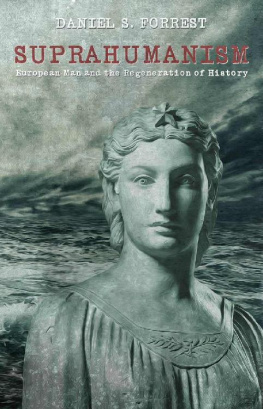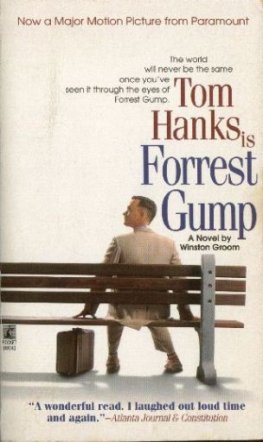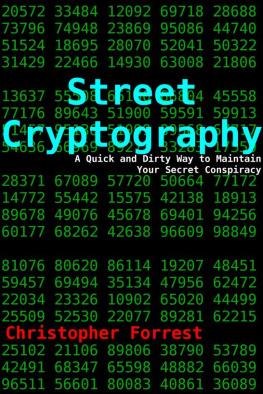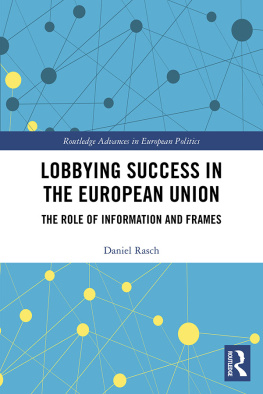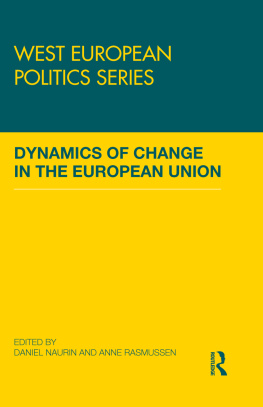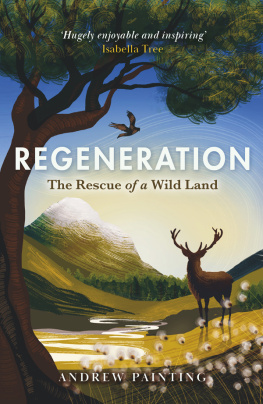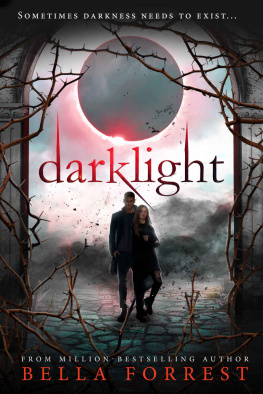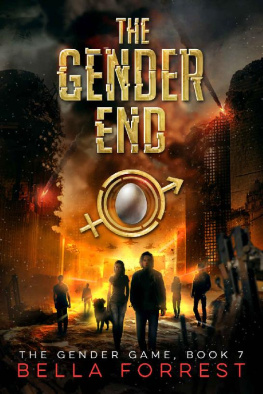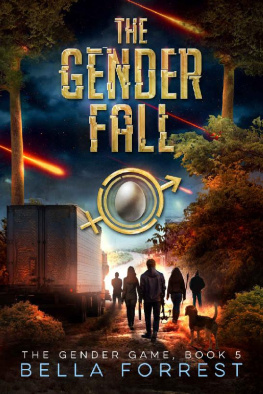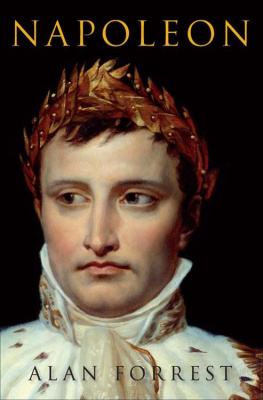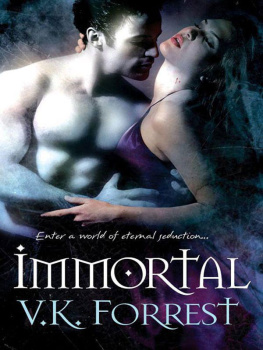Daniel S. Forrest - Suprahumanism: European Man and the Regeneration of History
Here you can read online Daniel S. Forrest - Suprahumanism: European Man and the Regeneration of History full text of the book (entire story) in english for free. Download pdf and epub, get meaning, cover and reviews about this ebook. year: 2014, publisher: Arktos, genre: Religion. Description of the work, (preface) as well as reviews are available. Best literature library LitArk.com created for fans of good reading and offers a wide selection of genres:
Romance novel
Science fiction
Adventure
Detective
Science
History
Home and family
Prose
Art
Politics
Computer
Non-fiction
Religion
Business
Children
Humor
Choose a favorite category and find really read worthwhile books. Enjoy immersion in the world of imagination, feel the emotions of the characters or learn something new for yourself, make an fascinating discovery.
- Book:Suprahumanism: European Man and the Regeneration of History
- Author:
- Publisher:Arktos
- Genre:
- Year:2014
- Rating:3 / 5
- Favourites:Add to favourites
- Your mark:
- 60
- 1
- 2
- 3
- 4
- 5
Suprahumanism: European Man and the Regeneration of History: summary, description and annotation
We offer to read an annotation, description, summary or preface (depends on what the author of the book "Suprahumanism: European Man and the Regeneration of History" wrote himself). If you haven't found the necessary information about the book — write in the comments, we will try to find it.
Suprahumanism: European Man and the Regeneration of History — read online for free the complete book (whole text) full work
Below is the text of the book, divided by pages. System saving the place of the last page read, allows you to conveniently read the book "Suprahumanism: European Man and the Regeneration of History" online for free, without having to search again every time where you left off. Put a bookmark, and you can go to the page where you finished reading at any time.
Font size:
Interval:
Bookmark:
Suprahumanism
Suprahumanism
European Man and the Regeneration of History
Daniel S. Forrest
ARKTOS
London 2014
First edition published in 2014 by Arktos Media Ltd.
Copyright 2014 by Arktos Media Ltd.
All rights reserved. No part of this book may be reproduced or utilised in any form or by any means (whether electronic or mechanical), including photocopying, recording or by any information storage and retrieval system, without permission in writing from the publisher.
Printed in the United Kingdom.
ISBN 978-1-907166-94-5
BIC classification:
Social & political philosophy (HPS)
Evolution (PSAJ)
Editor: Matthew Peters
Cover Design: Andreas Nilsson
Layout: Daniel Friberg
ARKTOS MEDIA LTD.
www.arktos.com
Table of Contents
Acknowledgements
My greatest debt is to Giorgio Locchi, the main suprahumanist thinker since 1945. He has been the inspiration for the present work, which intends to be both a personal synthesis of his ideas, and an inquiry into current trends applying his analytical method.
Above all, my deepest gratitude is to Richard Wagner and Friedrich Nietzsche. May their work conjointly serve as a powerful beacon on our way forward and upward.
Prelude
We may therefore hope that one day even Europe will be purified of all Jewish mythology. Perhaps the century has come in which the peoples of the Indo-European group of languages will again receive the sacred religions of their native countries; for they have again become ripe for these after having long gone astray.
Arthur Schopenhauer

Richard Wagner (Munich, ca. 1870).
Suprahumanism rests on two pillars: Wagner and Nietzsche. Contemporaries who were friends, notwithstanding their difference in age friends who then parted company and became intellectual enemies: with the young philosopher attacking the composer ferociously, but falling in love with his wife, Cosima.
It is easy to see an intimate relation between the work of Wagner and of Nietzsche. Th ey constitute the two poles of the mythical field of suprahumanism.
After they parted company, Nietzsche suffered greatly in distancing himself from the only man he had ever loved. However, this suffering arose from a kind of metaphysical jealousy. Nietzsche would have wished for the place in history accorded to Wagner.
Nietzsche, the philosopher of perpetual becoming, could not endure Wagners expression of the philosophy in music. Nietzsche established the philosophical myth of the superman ( bermensch ). He explained its logic and created a language for it. However, the myth existed already in the form of Wagnerian opera. Nietzsche merely gave a name to what already existed in music but this he could never admit. Nietzsche deliberately concealed the Wagnerian origin of his Zarathustrian vision.
Having started with an assault on Wagners music decadent art par excellence Nietzsche concluded by criticising almost all German music for leading inevitably to Wagner. He sets pure melody described as Mediterranean against harmony described as Nordic.
Music and Philosophy
Richard Wagner may be considered the most magnetic and powerful artistic voice of the nineteenth century and a profound influence on modernity. From Wagners death until the First World War, composers, painters, philosophers, novelists, dramatists, and poets strove mightily to come to terms with his strangely vibrant and living legacy. No composer before or since has left such an enduring mark on the course of cultural history. Few artists have embraced public life so assiduously, and inspired so much controversy in politics as well as in art.
In Wagner, music, drama (i.e., tragedy), and myth are closely related. Music , according to him, is an idea of the world . Th e image of the ring of the Nibelung the ring which gives its name to the tetralogy is the living symbol of the spherical conception of history: the music of eternal recurrence. Th e return to a mythical past associated with a leap into the future. A new present of human consciousness, a deeper past: that of a reconquest of origins and the promise of a longer future. A return to our deepest origins, and a zeal to thrust forward into the furthest future.
Wagner and Nietzsche belong in the same mythical camp. However, this does not imply that in this myth, they manifest the same ideological identity. In Richard Wagner in Bayreuth (1876), Wagner was still, for Nietzsche, a universal genius: simultaneously philosopher, historian, and artist, master of diction and mythology, and mythic poet. In fact, Wagner the philosopher never succeeded in drawing philosophy from the myth created by Wagner, the poet and musician. Nietzsche realised this and became conscious of his superiority as a philosopher, a superiority Wagner was happy to acknowledge.
Suprahumanism, as historical tendency born from the European soul in the mid-nineteenth century, became a sort of magnetic field in expansion with two poles: the artistic work of Richard Wagner, and the poetic-philosophical work of Friedrich Nietzsche.
Th e Choice
Th e egalitarian ideology of primitive Judeo-Christianity is the preponderant value system today. Th e masses , devoid of real masters : true models with whom to identify reject the pagan residue inhabiting the collective unconscious of Europe for centuries ( the Indo-European heritage ). Th ey aspire instead to a humble and mediocre happiness through regression into a pre-human past .
What, then, is the alternative offered to the men of our age? Nietzsche said that the choice was between the last man : the man of the end of history and the leap towards the superman : the regeneration of history. Ultimately, the outcome will depend on us on European men and women on the choice we make between these options. For us, the historical decision is always and at the same time a wake-up call addressed to the past, to a forgotten or lost origin; a decision to surpass a decaying present; and the undertaking of a future project that has hitherto never taken place because it is suprahumanist.
Modern man, the very image of declining paganism: accepting the fate of the Christian mask. However, his most intimate will is not destroyed: it lies dormant. Its presence invokes the person who will come to awaken it; and this is the end for which the god is waiting the beginning of a new history: regeneration.
Postmodernity may be defined as an interregnum . A period of waiting during which destiny hangs between two options: either to complete the triumph of the egalitarian conception of the world, the end of history , or to promote a historical regeneration .
Imperium
Regarding our future, all we know for certain is that it lies before us. We also know it is never possible to turn back the clock. Every invention contains the need for further inventions. Any fulfilled wish gives rise to a thousand others. Any triumph over nature stimulates still greater triumphs.
Th ere may only be return to what formerly allowed us to confront new challenges, and to affirm ourselves. Our restless exploring of the world, and the technologies derived from so doing, condemn us to making choices: they offer us power, but cannot direct us as to its use. Such decisions lie not with engineers, scientists, or lawyers, but with founding heroes , poets and with a new aristocracy that knows how to activate the obscure collective will of the community from which they arise.
Th e one great goal toward which European foreign policy should strive is the development of a worldwide community transcending present geographical nationalism in which all men and women of European blood and culture will be part. Th e replacement of a parochial outlook with European world solidarity and a final elimination of fratricidal war, would count among the enormous benefits of such a development.
Font size:
Interval:
Bookmark:
Similar books «Suprahumanism: European Man and the Regeneration of History»
Look at similar books to Suprahumanism: European Man and the Regeneration of History. We have selected literature similar in name and meaning in the hope of providing readers with more options to find new, interesting, not yet read works.
Discussion, reviews of the book Suprahumanism: European Man and the Regeneration of History and just readers' own opinions. Leave your comments, write what you think about the work, its meaning or the main characters. Specify what exactly you liked and what you didn't like, and why you think so.

